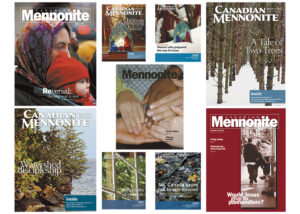A letter writer in this issue questions the practice of yoga and doing labyrinths and other types of what she calls “non-biblical meditation and prayer.”
“Are these practices of the Bible?” Angela Harder asks rhetorically. “Did Jesus teach us to do these things?
In an upcoming edition, another writer asserts that the concept of stewardship is “non-biblical,” as it was expressed in a story about a “creation care” day event at Rosthern Junior College in Saskatchewan. Calling stewardship an “eco-theology buzzward,” he claims it has come from “a desire to tone down the Genesis imperatives to "subdue the earth and have dominion over it" (Genesis 1:28).
Enough already, another writer agonizes (also in an upcoming edition), over the ongoing discussion about John Howard Yoder’s sexual abuse. “As a friend of the family, I feel for his wife and children when this matter is repeated over and over again. We still read the psalms of David and refer to the patriarchs of the Old Testament in spite of their sexual misconduct,” she writes, wanting "his brilliance and his brokenness [held] together," in calling for an end to the discussion.
In response to Gerhard Neufeld’s “Unlearning the Bible to welcome homosexuals” column (Jan. 6, page 15), Brent Kipfer in this issue uses the Scripture—as Neufeld warns—to insist that the Bible’s “prohibition of homosexual relationships reflects the same holy love of God. We do no one any favours by unlearning that.”
And a couple is pulling its financial support due to our publication of Neufeld’s column.
Thus goes some of the conversation on our pages.
While we are extremely pleased with this healthy engagement of our readers, and want to present all sides of an issue, we would like to caution our faith community of some subtle tendencies that can diminish the faithfulness of this conversation.
First, as people of the Book, we are very familiar with the stories and instruction comprising the narrative that is our guide for living. In some cases, however, familiarity breeds misuse. We are all too familiar with the dark side of our Anabaptist history, where we used the words of the Book as a weapon, taking the words of Scripture, often out of context, to hurl insults at each other, intending to intimidate and manipulate.
This has often resulted in division in congregations, fragmenting us as persons of faith, leading to splinter groups, and leaving families and individuals hurting and unable to put their lives back together. In some case, the bitterness is so severe that these persons depart from their faith and want nothing to do with the church.
What a tragic and unintended consequence! But our words and actions do have consequences. There is nothing wrong with stating our convictions with passion so long as we do so in a spirit of unity, rather than insisting that our views prevail above all others. None of us has all the truth, but together we come to knowledge of the truth (I Timothy 2:4).
Second, we need to hold the words of the scriptural narrative in context. As John Epp has pointed out in our “Sounding the Scriptures” feature interview, the native medium of the Bible, as it comes to us today, is speech. The cultures in which the ancient texts originated were “oral” cultures. The stories that form the biblical narrative come out of very different times from our own 21st century.
Thus, it is foolhardy to try and fit some of them literally into our cultural context. In our degrading environment, for instance, we quite correctly look at the creation story through the eyes of “stewardship,” rather than “having dominion”—the language of the culture out of which the story comes to us. The earth, in Adam and Eve’s time, was new and unspoiled. There were few people on the planet. Today, we are “spoiling” the earth at an alarming rate and our world can hardly sustain its overpopulation.
Thus, our urgent need to turn from earth’s developers to earth’s caretakers.
We live in an information and scientific age, where words are abundant, but often unexamined, often loosely and viciously used. And with the Internet, they are spoken not only to a small community of known persons, but to a worldwide audience in very different settings.
In light of these complexities—not only in our small faith community, but in the global community—let us guard our speech.






Leave a Reply
You must be logged in to post a comment.